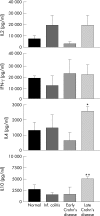Mucosal T-cell immunoregulation varies in early and late inflammatory bowel disease
- PMID: 17682002
- PMCID: PMC2095703
- DOI: 10.1136/gut.2006.116467
Mucosal T-cell immunoregulation varies in early and late inflammatory bowel disease
Abstract
Background and aims: Crohn's disease is a life-long form of inflammatory bowel disease (IBD) mediated by mucosal immune abnormalities. Understanding of the pathogenesis is limited because it is based on data from adults with chronic Crohn's disease. We investigated mucosal T-cell immunoregulatory events in children with early Crohn's disease.
Methods: Mucosal biopsies and T-cell clones were derived from children experiencing the first attack of Crohn's disease, children with long-standing Crohn's disease, infectious colitis, and children without gut inflammation.
Results: As in acute infectious colitis, interleukin (IL) 12 induced T cells from early Crohn's disease to acquire a strongly polarised T helper (Th) type 1 response characterised by high IFN-gamma production and IL12Rbeta2 chain expression. Th1 polarisation was not induced in clones from late Crohn's disease. Mucosal levels of IL12p40 and IL12Rbeta2 messenger RNA were significantly higher in children with early than late Crohn's disease. These results demonstrate that susceptibility to IL12-mediated modulation is strongly dependent on the stage of Crohn's disease.
Conclusions: At the onset of Crohn's disease mucosal T cells appear to mount a typical Th1 response that resembles an acute infectious process, and is lost with progression to late Crohn's disease. This suggests that mucosal T-cell immunoregulation varies with the course of human IBD. Patients with the initial manifestations of IBD may represent an ideal population in which immunomodulation may have optimal therapeutic efficacy.
Conflict of interest statement
Competing interests: None.
References
-
- Fiocchi C. Inflammatory bowel disease: etiology and pathogenesis. Gastroenterology 1998115182–205. - PubMed
Publication types
MeSH terms
Substances
Grants and funding
- R37 DK044319/DK/NIDDK NIH HHS/United States
- DK51362/DK/NIDDK NIH HHS/United States
- DK44319/DK/NIDDK NIH HHS/United States
- R01 DK051362/DK/NIDDK NIH HHS/United States
- R01 DK054213/DK/NIDDK NIH HHS/United States
- P01 DK057756/DK/NIDDK NIH HHS/United States
- DK30399/DK/NIDDK NIH HHS/United States
- R37 DK030399/DK/NIDDK NIH HHS/United States
- R01 DK050984/DK/NIDDK NIH HHS/United States
- DK57756/DK/NIDDK NIH HHS/United States
- DK54213/DK/NIDDK NIH HHS/United States
- R01 DK044319/DK/NIDDK NIH HHS/United States
- DK50984/DK/NIDDK NIH HHS/United States
LinkOut - more resources
Full Text Sources
Medical
Research Materials





